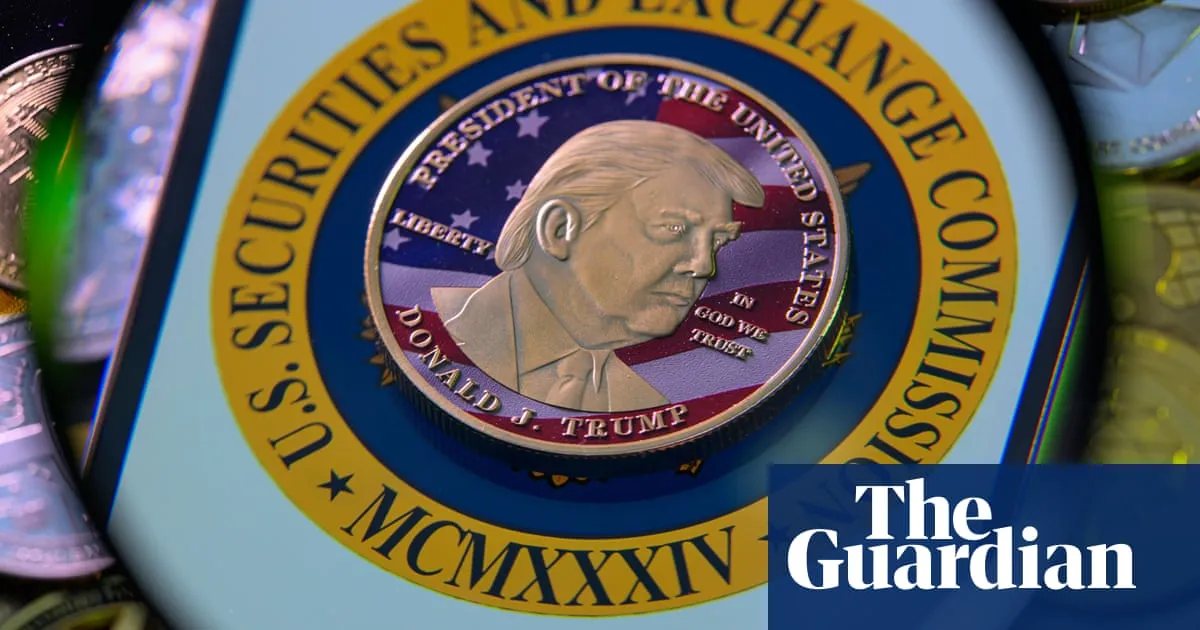
Former President Donald Trump is facing intense scrutiny over his recent efforts to significantly reduce oversight of the cryptocurrency industry. This push comes at a time when Trump and his sons are actively expanding their own crypto ventures, which have reportedly generated billions of dollars from both domestic and foreign investors. This situation has prompted alarm regarding potential ethical and legal implications.
Watchdog groups, along with congressional Democrats and some Republicans, have voiced strong concerns about Trump's promotion of his own memecoin, $Trump. This novelty cryptocurrency, which lacks inherent value, was thrust into the spotlight when Trump hosted a lavish dinner at his Virginia golf club on May 22. The event catered to the 220 largest buyers of $Trump, alongside a private reception for the top 25 buyers. Attendance at these events cost approximately $148 million, which is expected to benefit Trump and his business partners, according to the crypto analysis firm Inca Digital.
In addition to promoting $Trump, the Trump family's cryptocurrency venture, World Liberty Financial (WLF), launched last fall and has since played a pivotal role in a $2 billion investment deal with an Abu Dhabi financial fund in the crypto exchange Binance. Notably, Binance faced legal troubles in 2023, pleading guilty to charges related to money laundering and other violations. The announcement of the WLF deal coincided with an Abu Dhabi crypto conference attended by Eric Trump just weeks before Trump's own visit to the United Arab Emirates, raising further questions about foreign influence and ethical standards.
A report from the State Democracy Defenders Fund revealed that Trump's cryptocurrency ventures were valued at approximately $2.9 billion as of mid-March, a staggering figure considering the ventures are less than a year old. In response to these developments, Senate Democrats, led by Jeff Merkley of Oregon and Chuck Schumer of New York, introduced legislation aimed at preventing Trump from leveraging his presidential office for personal gain related to his crypto businesses.
Experts are raising alarms about the potential conflicts of interest stemming from Trump's actions. Richard Painter, a former White House ethics adviser, pointed out the troubling appearance of corruption associated with Trump's dinner event and the WLF deal with the Abu Dhabi fund. Columbia Law professor Richard Briffault echoed these concerns, emphasizing that Trump's ability to profit from his memecoin while serving as the primary regulator in the sector is unprecedented in American history.
Trump's administration has displayed a pattern of favoring crypto industry allies for regulatory roles, including appointments to the Securities and Exchange Commission (SEC). Reports indicate that the SEC has paused investigations into various crypto firms, raising fears of corruption. A significant investor in Trump's crypto ventures is Justin Sun, who has faced his own legal issues with the SEC. Sun's substantial investments in both $Trump and WLF, combined with the SEC's relaxed oversight, have led to concerns from senators like Elizabeth Warren and Maxine Waters regarding potential conflicts of interest.
The cryptocurrency sector has been marred by scandals, including illicit activities linked to North Korean hackers. This backdrop has intensified scrutiny of the Justice Department’s recent decision to dissolve a national cryptocurrency enforcement team, which had been critical in addressing major crypto crimes. The department's memo criticized the Biden administration for its regulatory approach, coinciding with a pro-crypto executive order issued during Trump's presidency.
In the face of mounting criticism, Trump, his family, and White House officials have dismissed allegations of ethical improprieties. White House press secretary Karoline Leavitt stated that Trump's participation in the dinner was in his "personal time" and not an official White House event. Furthermore, the Trump Organization announced plans to place his business interests in a trust managed by his children, distancing him from daily operations.
Senators Merkley and Schumer have introduced the End Crypto Corruption Act, which aims to curb corruption and prevent public officials from profiting from conflicts of interest. Merkley emphasized that the bill would address not only Trump's activities but also those of other influential figures in the crypto space, such as Elon Musk. Concerns about foreign investments in Trump's crypto ventures have also been echoed by several watchdog groups, highlighting the potential risks to national security and economic stability.
As Trump's cryptocurrency initiatives continue to unfold, the implications for ethics, governance, and national security remain pressing. With significant foreign investment and ongoing regulatory challenges, the landscape of cryptocurrency in the U.S. will be closely monitored in the months ahead. The situation underscores the need for rigorous oversight and a commitment to ethical standards in the burgeoning crypto industry.